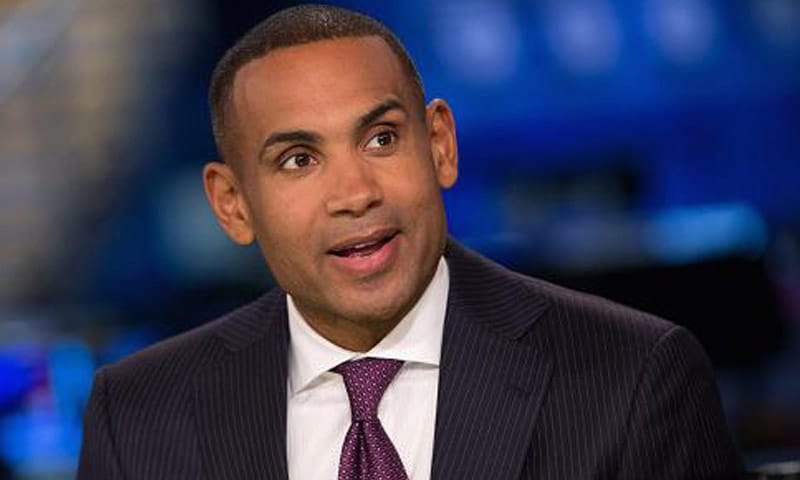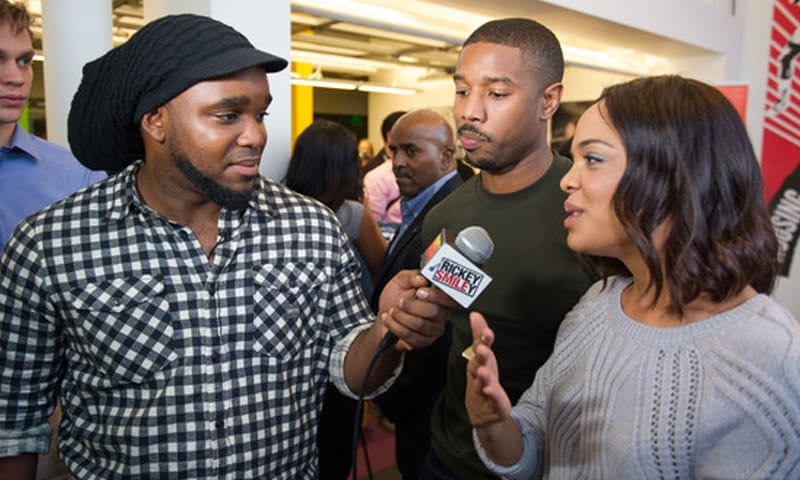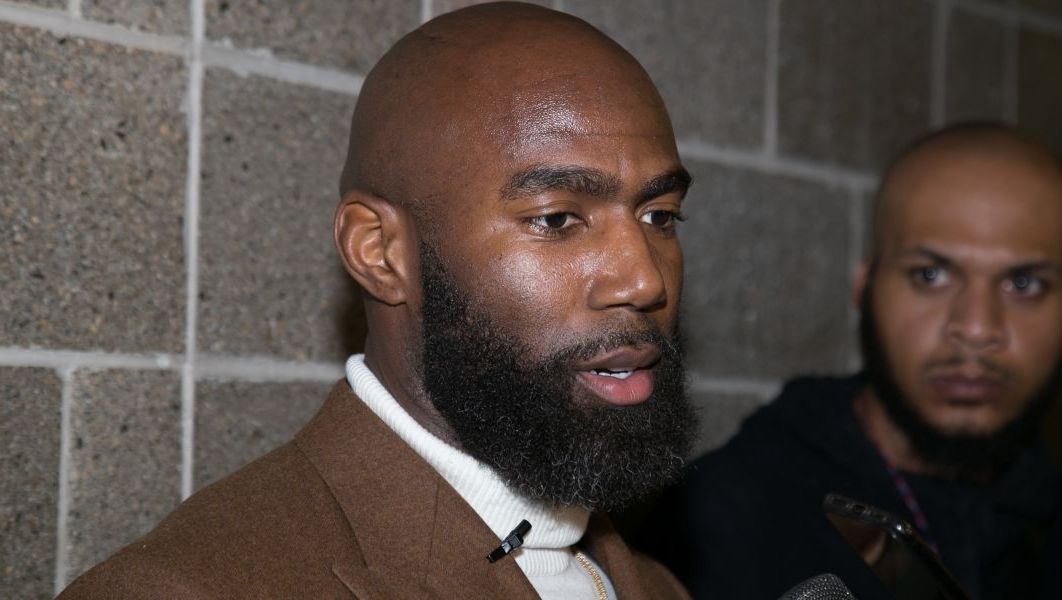|
10/29/2019 Eagles Safety Malcolm Jenkins On His #HEARPHILLYSPEAK Town Hall And If He's Open To Working With Colin KaepernickRead NowThe Players Coalition held a town hall to advocate for civilian oversight and changed Philadelphia police and community relations.
A tree that bears fruit has literal and symbolic meanings.
The physical fruit can be a source of nourishment for living creatures. The idea or concept of “bearing fruit” has religious and/or symbolic meaning like “fruit of the womb” or “fruit of one’s mouth.” “Bearing fruit” has also come to mean yielding results, products, outcomes, accomplishments and achievements. Suffice to say, any arborist would tell you, if your tree continues to bear “bad fruit,” you need to look into what’s going on with said tree. That’s where we find Philadelphia Eagles’ safety Malcolm Jenkins. He’s not an arborist by training. But he is seeking to understand and dismantle a tree (read: system) that bears the most awful and disgusting fruit impacting the city of Philadelphia and many cities across the country. On Monday evening (October 28) Jenkins, through the Players Coalition, which he co-founded with former NFL player Anquan Boldin, held a town hall in Philadelphia to address over-policing.
Philadelphia is one of the poorest big cities in America, and there has been decades of mistrust between local citizens and the Philadelphia Police Department.
Earlier this year, then police commissioner Richard Ross abruptly resigned amid reports of sexual harassment and racial and gender discrimination within the department. Jenkins and the Players Coalition, whose collective goal is making an impact on social justice and racial equality at the federal, state and local levels through advocacy, awareness, education and allocation of resources, saw the Ross resignation as an opportunity for real change. “Policing is a big deal right now, not only around the country but right here in Philadelphia,” Jenkins told BET. “A lot of what we do around the Coalition, we talk about issues around criminal justice, education, things like that. One of the main things is police and community relations. There is no way to build a relationship between anybody, let alone police and the community, without accountability.” We all know the statistics, and we are subject to the horror stories on a seemingly daily basis. Black people are 2.5 times more likely to be killed by police than white people, according to Rutgers University’s School of Criminal Justice. Approximately 1 in 1,000 Black boys and men will be killed by police in their lifetime. For white boys and men, the rate is 39 out of 100,000. The website Mapping Police Violence states police killed 1,147 people in 2017. Black people were 25% of those killed despite being only 13% of the population. Staggering. Yet unbelievably believable. As ugly and disgusting as the sanctioned killing of unarmed Black citizens is, Jenkins says to fix the problem, we need to stop looking at it on an interpersonal level. “The day-to-day won’t change unless we change it at the top...the only way to do that is to ask ‘who holds police accountable?’ Those people are the district attorney, the police commissioner, and the mayor...if we look at an officer who violated a citizen, harassed them or did whatever and we get that officer fired, then what? That officer is the symptom of a greater problem. So yeah we can get that officer fired, but he comes from a culture where that is acceptable and there are other officers being trained just like him. He will just be replaced by another one, likely to do the same thing.” An ambitious goal, no doubt. But you get a sense that Jenkins doesn’t want to see cosmetic fixes. Toppling a system is painstaking work, but he seems willing to take on as much as he can. The Players Coalition is invested in root causes and making policy changes at the government level. That was the goal of Monday’s town hall. Concerned citizens from Philadelphia gathered together with an opportunity to let the Mayor Jim Kenney know what type of standards they would be holding the new police commissioner to. Quite frankly, what they expect from the Mayor’s office as well. Kenney wasn’t on hand, but someone from his office was present during Monday’s town hall. The hope is that what was discussed will reach his desk and be given the appropriate time and attention. If the concerns of the citizens are not met, Jenkins believes they have the power to find someone who will commit to the needs of the people. “This [appointment of a new police commissioner] affects a lot of people in Philadelphia, and we need to encourage people. That is the ultimate way to participate. You can make your voice be heard. You can post, you can tweet. You can do all those things. But unless you vote...that’s what moves politicians. "That’s what moves policy, is people coming out to vote and making their voice really count. For us, that’s the call to action. It’s not just the event, but then the follow up to make sure we are going out and letting our voices be heard so that those candidates represent the issues that matter the most to us...there are some people up for election and this is the time where you put pressure on them. If they want your vote, then they need to be doing the things we’ve asked them to do.” Such is the plight, not just in Philadelphia but all across the United States, where problems of excessive force and over-policing exist. Too many communities are grossly underfunded, leading to poor schools, poor housing options and increased crime. It’s all connected. Attempting to solve the crime problem without addressing the root cause is like putting lipstick on a pig. Or in this case, throwing gasoline on a consistently burning fire. “Adding more police and over policing those areas we’ve seen over time does not work,” said Jenkins. “So there needs to be another strategy that involves reallocating resources to these communities, and adding support to these communities. It is my belief that people are not innately violent. Violence and crime are usually tied to poverty. With Philadelphia being one of the poorest, largest cities. That is something we need to address.” Many sociologists, politicians and activists agree that the way to solve crime is not by funding the police departments that create mini military units that come in and stomp all over these communities, but rather address why these specific areas receive substandard funding. Because all the over-policing does is fund the prison industrial complex and deny chances for individuals to get out of poverty. During Monday’s town hall, Keir Bradford-Grey, chief defender of the Defender Association of Philadelphia, said the following: “We hand out criminal convictions like candy, and need to address how policing relates to the rest of the system. Root causes of how Black and Brown folks enter the system. Over policing is a big burden on our city. We need to solve these issues, and not brand families with permanent convictions.” Will it ever get better? You have to live in hope, right? If not, what else is there? Jenkins and players like him across the NFL want to do their part, but dismantling centuries-old systems will take a lot more people committed to the cause. “Support and action are two different things,” Jenkins said. “I get a lot of people that praise me or acknowledge the things that I do. They say that I’m doing good work and they’ll say, ‘Keep it up!’ But that doesn’t equate into them getting involved.” Earlier in our conversation Jenkins told me, “Collectively, we all need to make this our issue.” I don’t doubt for a second his sincerity and earnestness in wanting to work with as many like-minded people as possible to bring about real change. Given his stance, I had to ask him about Colin Kaepernick. At one time Kap and Carolina Panthers safety Eric Reid were on board with working with Jenkins and the Players Coalition. Accounts differ as to why they split, some say it was over money, some say ego. Nobody but the men involved actually know. But as time has passed, it seems Jenkins has come to some realization. “We’re all aiming for the same thing. That’s justice and a country that’s equitable for everybody. We want to remove these things that for centuries have marginalized Black and Brown communities, so yes, we have the same goal. The approach may be different. But for me, I’ve always kept my doors open for anybody who wants to make change. We may not agree on how we get there, or what the tools are that we use. But if we’re headed in the same direction? I’m always open for it.”
2 Comments
|
Details
Archives
February 2020
Categories |



 RSS Feed
RSS Feed